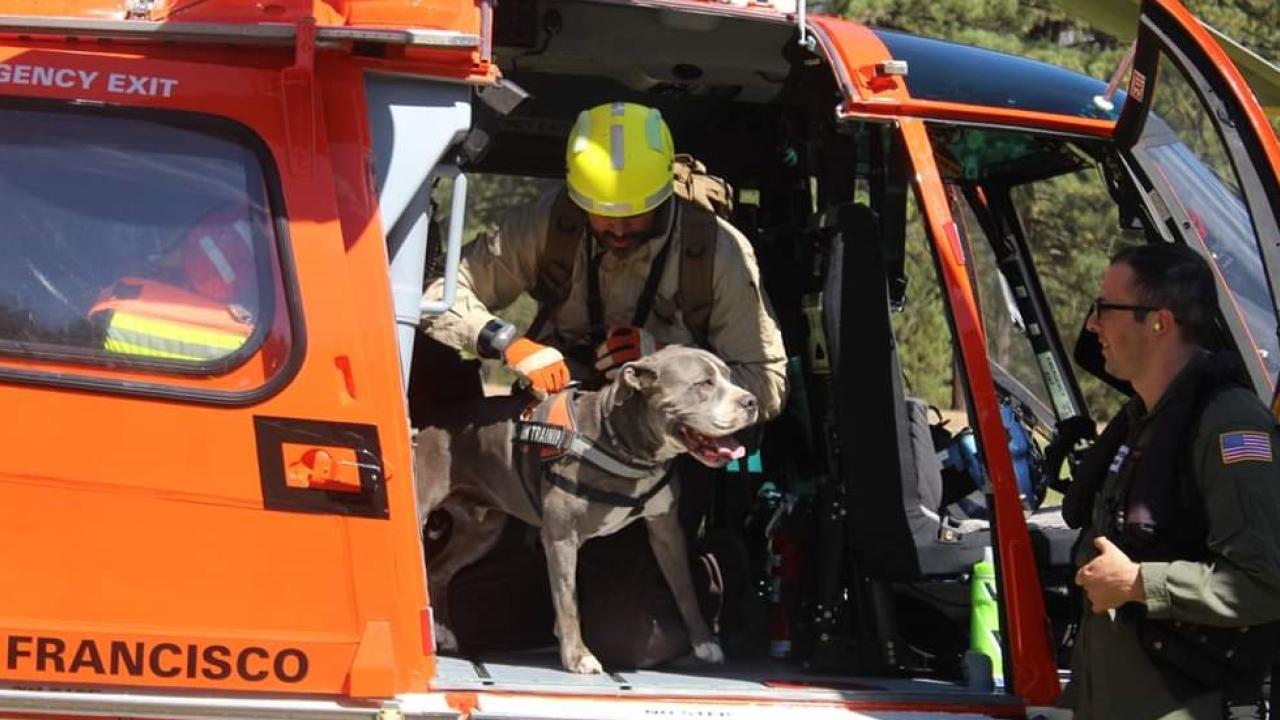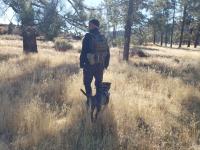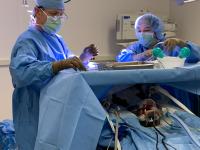
Knee Surgery Gets Rescue Dog Back on the Search
“Case of the Month” – June 2021

Clutch, an 8-year-old pit bull terrier, was rescued five years ago from a shelter just before being euthanized. His new owner, Al Thielemann, noticed his ability to stay active so he started training Clutch in a variety of jobs – dock diving, nose work detection, and other types of working activities. But Clutch preferred to be off leash and be more active.
While trying to figure out Clutch’s calling as a working dog, Thielemann was speaking with a drug detection dog handler. The handler told him to throw a ball into a field for Clutch. If Clutch continued to search for the ball and wouldn’t give up, then he could be a candidate for a search and rescue dog. Sure enough, Clutch never gave up trying to find the ball, so Thielemann started him on a 3-year training process with the California Rescue Dog Association (CARDA) in “live find” detection – finding living humans lost in wilderness settings.
CARDA’s mission is to train, certify, and deploy highly-qualified search dog teams to assist law enforcement and other public safety agencies in the search for lost and missing persons. Thielemann trained with Clutch as an apprentice handler.
Toward the end of his training to become certified “mission ready,” Clutch’s progress was stalled by the COVID-19 pandemic. After being off from training for several months, Clutch’s return to training resulted in an injury – a ruptured cranial cruciate ligament (CCL), similar to a torn anterior cruciate ligament (ACL) in humans.

To fix the injury, Clutch was brought to the UC Davis veterinary hospital where the Orthopedic Surgery Service performed a tibial plateau levelling osteotomy (TPLO) after removing the ruptured ligament. Without a CCL, Clutch’s knee joint becomes too unstable. Eventually, the sloped top of the tibia would cause the bone to move out of the stifle joint without a CCL to hold it in place. To correct this, surgeons flatten that slope on the top of the tibia so that Clutch’s muscles can hold his knee stable. The successful TPLO not only helped to stabilize Clutch’s knee, but also improved comfort and function.
Three months after surgery, Clutch was able to return to training. On his first training back, he covered a 40-acre site and found his search subject within 25 minutes.
Part of Clutch’s care at UC Davis was covered by the Faithful Partner Fund, a donor-funded resource to assist with the medical costs of treating K-9 officers, as well as search and rescue dogs, injured in the line of duty. The UC Davis veterinary hospital has a long history of caring for these working dogs, and routinely offers free annual teeth and eye examinations for them.

Most law enforcement agencies and search and rescue groups do not have specific funding budgeted for the dogs’ healthcare. The majority of medical costs are most often borne by the handlers and/or from contributions by the unit.
To ease that burden, the Faithful Partner Fund was initially started by matching $25,000 contributions from both UC Davis’ School of Veterinary Medicine and Police Department. As those funds can quickly be depleted, the program welcomes contributions from its veterinary partners, the public, law enforcement agencies, and federal search and rescue groups.
Learn more about the Faithful Partner Fund and please consider a donation
# # #
As the UC Davis veterinary hospital looks to transform into the future Veterinary Medical Center (VMC) over the coming decade, success stories like Clutch's will be improved by innovative discoveries made by clinicians, scholars, and students collaborating in integrated teams to advance the health of animals. Built to promote clinical innovation, transformational research discovery, and compassionate healing, the VMC's hallmark of attentive and personalized care will see more animals like Clutch returning to happy, healthy, and meaningful lives.
